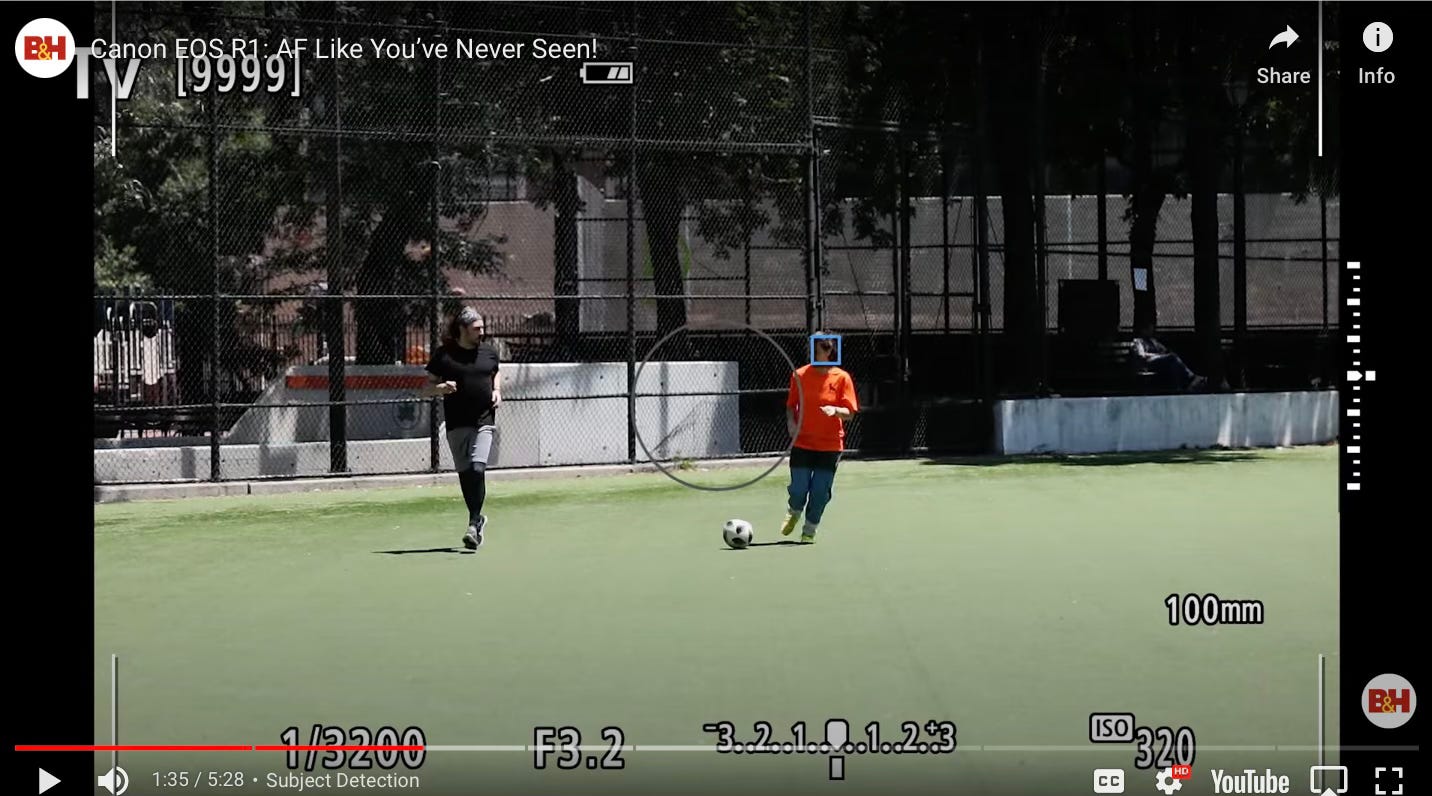When I watched the video overview of the just-announced Canon R1 flagship mirrorless camera, I was impressed. There’s an amazing amount of intelligence built into this camera.
One elegant example was demonstrated in a YouTube video published by B&H Photo. Two soccer players were dribbling toward the camera, as they passed the ball back and forth, the R1 shifted its focus automatically to the person with the ball. Impressive.
And that’s just one of a plethora of pro specs that will be mouth-watering for sports photographers and photojournalists.
24MP Full-Frame Stacked BSI CMOS Sensor
DIGIC Accelerator + DIGIC X Processing
Cross-Type Dual Pixel Intelligent AF
Improved Eye Control AF
6K 60 Raw & 4K 120 10-Bit Internal Video
Up to 40 fps, Pre-Continuous Shoot Mode
9.44m-Dot 0.9x EVF, OVF Sim. View Assist
3.2" Vari-Angle Touchscreen LCD
Vertical Grip, 2x CFexpress Type B Slots
Wi-Fi 6E, 2.5G Base-T Wired Ethernet
There’s only one problem… well, maybe two.
First, the Opening Ceremonies for the Paris Olympics (the coming out party for the Canon R1) is on July 26th. That’s only a week away as I write this.
The Olympics are not the kind of high-stakes event where you test a brand new camera that’s more sophisticated than anything you’ve ever shot. What you need at the Olympics is dependable - as in “I can’t miss a shot” dependable.
When I worked the 2008 Summer Games in Beijing, I was in the Media Center when photographers came rolling in with memory cards full of shots - sometimes thousands of photos.
The Media Center was filled with computers and preloaded with software to help photographers process their images quickly. And there was staff to assist.
What happened, nine times out of ten, is that the photographer wanted either Photo Mechanic or Photoshop or both, and nothing else. In other words, the Olympics were not the venue to learn new ways of doing things.
That leads me to problem number two. In a Petapixel report, titled, The Canon R1 Feels Rushed Even With Three Additional Development Years, Jaron Schneider wrote about the firmware problems journalists were experiencing as they tried to test the camera in Phoenix, AZ.
“I was one of the lucky ones during the extremely short three-and-a-half-hour session we had with the R1 and the R5 Mark II in Arizona: my firmware was bug-free. While I had no problems with either camera, other members of the media I spoke to later lamented frequent crashes, glitches, and other issues with their samples.
Pre-release firmware is par for the course when it comes to early looks at new cameras but it has become rare for that firmware to be noticeably buggy to the degree it detracts from our ability to capture photos reliably. The Canon representatives I spoke to didn’t even refer to it as pre-release, but rather as “beta” firmware. Beyond that, not every R1 on hand was running the same beta firmware.”
Now, obviously there’s some time between the media event in Phoenix and the Olympics in Paris. But possibly not enough to clean up the firmware and allow photographers a chance to get comfortable with the new gear.
I mention this because I want Canon to have a fantastic launch with the R1. Photographers have been patiently waiting for this camera. And I want to see amazing images from it, not grumblings about glitches.
Deadlines are funny things, aren’t they? Even though you know the Olympics are three years away when you start on the project, suddenly they are opening in a week.
I’m rooting for both the United States and Japan: The U.S. for earning as many medals as possible, and for Canon photographers capturing those moments with the R1.





It's funny that you mention this, Derrick. I'm about about halfway through this week's Petapixel podcast, which Jaron leads, and it is one of the most uncomfortable conversations I've ever listened to. It's not because Jaron, Chris, and Jordan are afraid to be candid; they are sometimes brutally honest, and I think they operate with exceptional integrity. But I also sense that they're trying not to rain on Canon's parade here, because they want them to succeed; they want the R1 to be the home run Canon so badly needs right now.
I'm hearing things like,"to be fair, this is beta firmware", "the focus tracking worked well once you did A, B, and C", and "we only had the cameras for a few minutes." But it doesn't take much reading between the lines to discern that the R1 and its firmware as they sit today are not only not ready for something like the Olympics; they're not even ready to hand over to reviewers for preliminary evaluations to build the excitement Canon wants and needs ahead of this release.
Part of my job as Marketing Director of Content for my company is to help product managers and their teams prepare for new product releases. We routinely have to say "no" to showing products at trade shows or releasing software or firmware updates because we can't risk embarassing ourselves with products that aren't ready for prime time just to show it off in the booth or feature it in a trade publication. The stakes are too high.
That's where Canon is with the R1. It's several years too late and it's still not ready, but they're getting panicky as they watch Nikon with the Z9, the Z8, the Zf, and now the Z6III. No, the R1 isn't going to be their bread-and-butter enthusiast camera, but it's a critically important product for the professionals who make their living with their products and who cannot afford to risk their careers or their reputations with their customers with a science experiment. Once a manufacturer loses that trust with their core customers, it's difficult if not impossible to get back.
Good points.